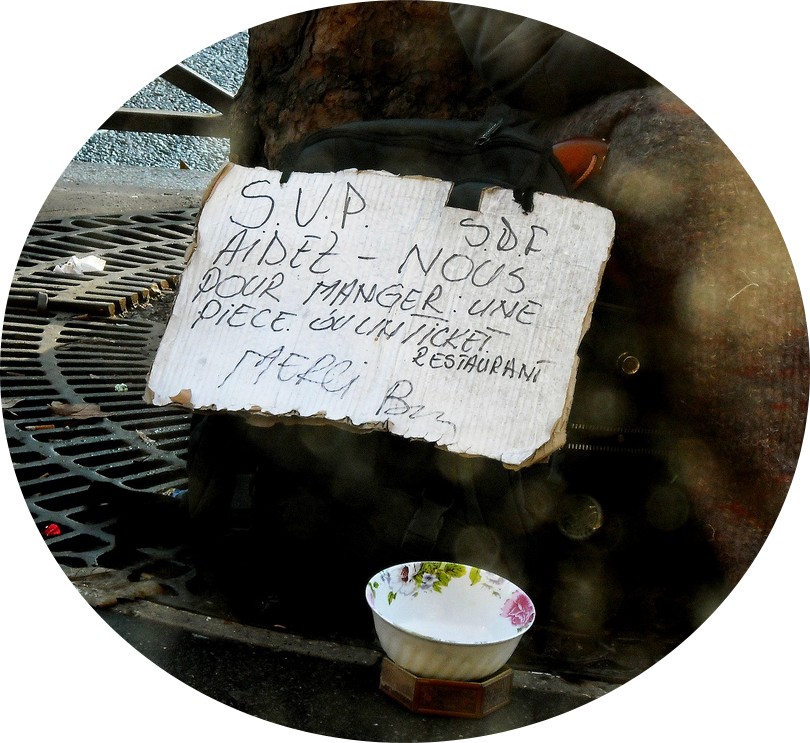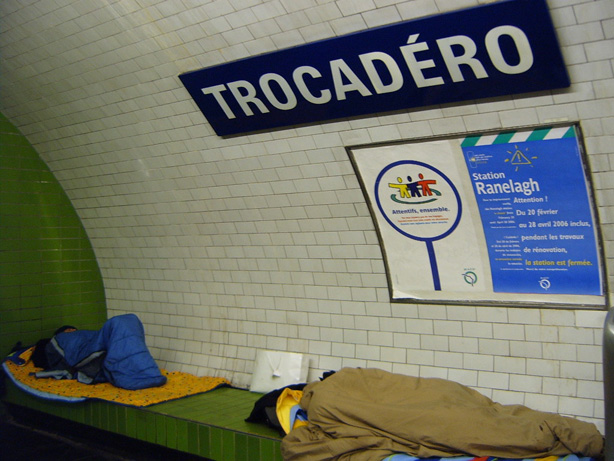The happiness in Paris experiment – part six: helping others

Maslow’s hierarchy of needs (a five-tiered pyramid ranking the priorities and motivations of human beings) places this sort of project squarely in the top tier: self-actualisation. Once the basics are taken care of – food, water, shelter – we turn our attention to safety and security, before moving into the ‘belongingness’ tier.
At the esteem level we seek independence, status and respect, and in the final tier we focus on personal growth and peak experiences – a happiness experiment, for example. And whilst I’ve no fear of heights, I’m uncomfortable about this lofty position.
There’s a great episode of ‘Friends’ where Phoebe tries to find and complete one truly selfless act, but fails, finding that helping others only serves to make her feel good inside. As for me, I’m not looking to be genuinely selfless, but rather wondering if the answer to happiness perhaps lies outside of oneself. And so I decided, in no organised sort of way, to test this theory out in ma vie quotidienne à la France.
https://www.youtube.com/watch?v=ahDxg3hc5pM
Helping others begins at home in France
There’s a Frenchman who lives in my street. He has lovely clear blue eyes and enjoys a cigarette while he reads. He doesn’t like the taste of alcohol. Most of the time he wears a rather jaunty, multi-coloured hand-crocheted beanie, but occasionally he mixes it up with a baseball cap or a Gilligan-style boater hat. He also happens to be homeless. For obvious reasons, I like to call him Monsieur Chapeau.
The French food dilemma
Growing up, myself and many other fussy-eaters of my generation were constantly badgered by our parents with, “Finish your dinner: there are starving children in Africa you know!”. With many a long hour spent sitting at the dinner table, four-year-old me had plenty of time to think about the best way to send my broccoli heads and carrot rounds to Africa.
“When the situation seems abstract or far away, it can be hard for us to connect with it in a meaningful way. But when that starving man shares your postcode, it’s harder to hold onto your first world problems.”
Fast forward a few decades and grown-up me cannot stomach the thought of letting good food go to waste. This way of thinking often leads me to eat past full in restaurants just so I can finish my plate, and to bake endless loaves of banana bread just to use up old fruit. However, future me would also like to be slim and fit, as Parisian clothes and society seem to demand.
I was walking up rue Montorgueil one day, after a stomach-stretching bowl of pasta. I crossed the street to avoid Monsieur Chapeau, as I had no cash on me. It occurred to me that perhaps the giving of food would be as welcome as loose change. From that point onwards, I decided that whenever I’m served a large portion in a restaurant, or the mushy bananas call my name, I knew exactly what I should do with all that extra food.
The Paris perspective
Here is a list of problems I’ve struggled with this week:
1. Weight worries – I’ve done nothing but eat out in restaurants for two weeks.
2. Clothing concerns – despite a full-to-bursting wardrobe.
3. Work stress – too many people wish to pay me for my work at once.
Here is a list of problems which Monsieur Chapeau has to deal with:
1. Weight worries – if he loses too much he won’t survive.
2. Clothing concerns – he owns one pair of pants, one t-shirt and three hats.
3. Work stress – he wonders if he’ll ever find paid employment again.
When the situation seems abstract or far away (like the starving African children), it can be hard for us to connect with it in a meaningful way. But when that starving man shares your postcode, it’s harder to hold onto your first world problems.
Indeed, how very nice the view from the top (tier) is once we step back far enough to gain a little perspective.
The bigger picture in France
On average, ‘a homeless person dies every 20 hours in France’, reads the headline of a sobering, yet unsurprising, headline on the Local.fr website earlier this year.
And typically here in France, I’m approached by three homeless people a day asking for help. Sometimes I offer my spare change. Most of the time I don’t.
“If every person helps that one homeless person on their corner … what difference could it make?”
“You can’t help everyone,” we say, and we feel better. “What difference would it make?” we justify.
But I wonder, if every person helps that one homeless person on their corner; if we feed them, and give them money, and clothe them, and speak to them, and learn their stories and include them; what difference could it make?
For me, this final part of my experiment turned out to be the most valuable. Picking up an extra baguette, or offering a hot chocolate on a rainy day was easy to do and paid happiness dividends aplenty.
And maybe the pyramid is little more than a vantage point, helping us to see what’s right in front of us.
What else can we do to make a difference and help? What do you do? Share your thoughts in the comments below.
Read more on the ‘Happiness in Paris’ experiment:Part 1: introduction
Part 2: writing in cafés
Part 3: living on French time
Part 4: health and well-being
Part 5: living vicariously
Part 6: helping others (this page) Image credits:
1. Homeless sign by Klovovi via Flickr.
2. Maslow hierarchy of needs by BetterWorks via Flickr.
3. Homeless metro by Annie Mole via Flickr.









This is an issue I have thought of so many times.
When I grow up I want to be this man:
http://www.bbc.com/news/blogs-news-from-elsewhere-27296489
Hi Ellen, thanks for that link, what a great, not over-thought, productive response to a situation. I can think of a hundred reasons why it shouldn’t work, which makes it all the more impressive that it does.
This is what concerned me about the recent article about the Arts budget in France. Yes arts are very important for cultural identity and tourism and of course for ‘art’s sake’, but there are literally people freezing to death on the streets daily in France. At the risk of sounding like a bore, I can’t help think that this should be a priority over art…
Hi Elise, thanks for reading. Absolutely, for me it’s a question that always enters my head whenever I see an expensive fireworks show.
Thank-you so much for this article Alison. It was really touching.
It breaks my heart how many home less people I see on a daily basis. What breaks my heart even more is that people start to stop seeing them- a Parisian friend seemed surprised when I commented on the numer of homeless people in Paris- he didn’t see anything out of the ordinary about it.
Hi Jill, thanks very much for taking the time to read and comment! I encounter the same thing over here, when I mention the issue I’ve had friends (Parisians and expats alike) say they’ve never noticed.